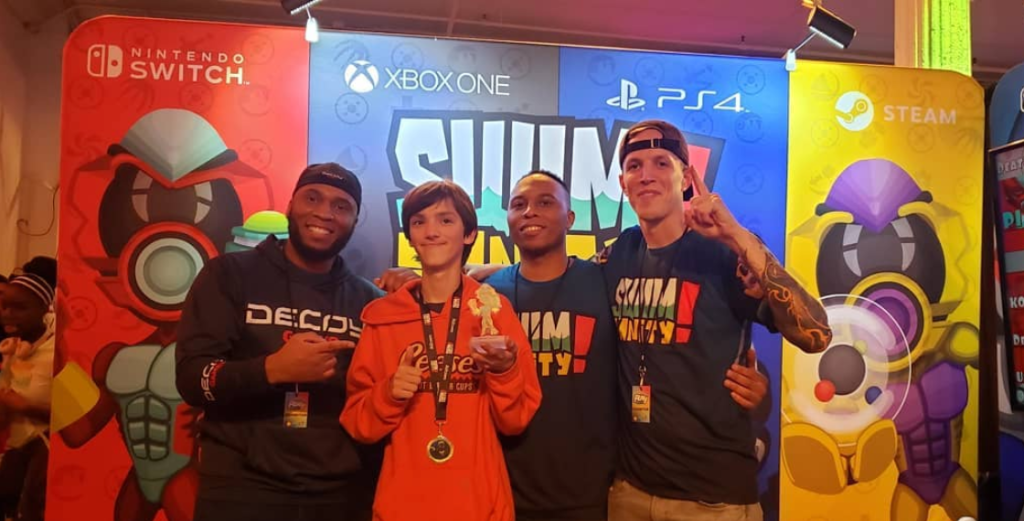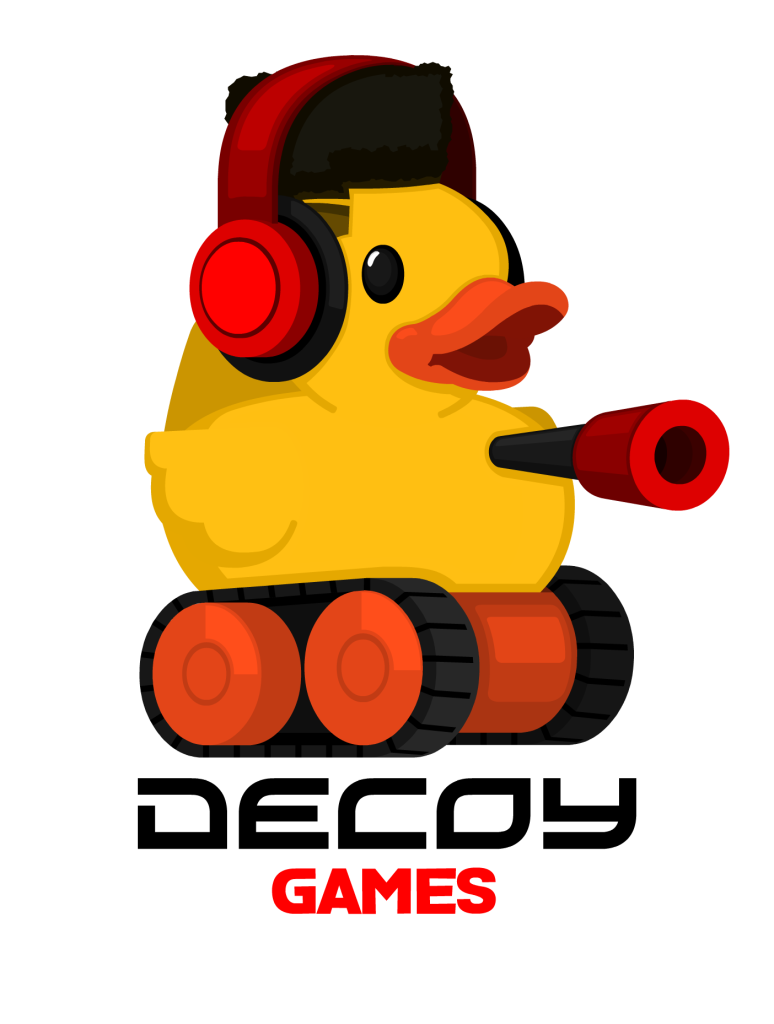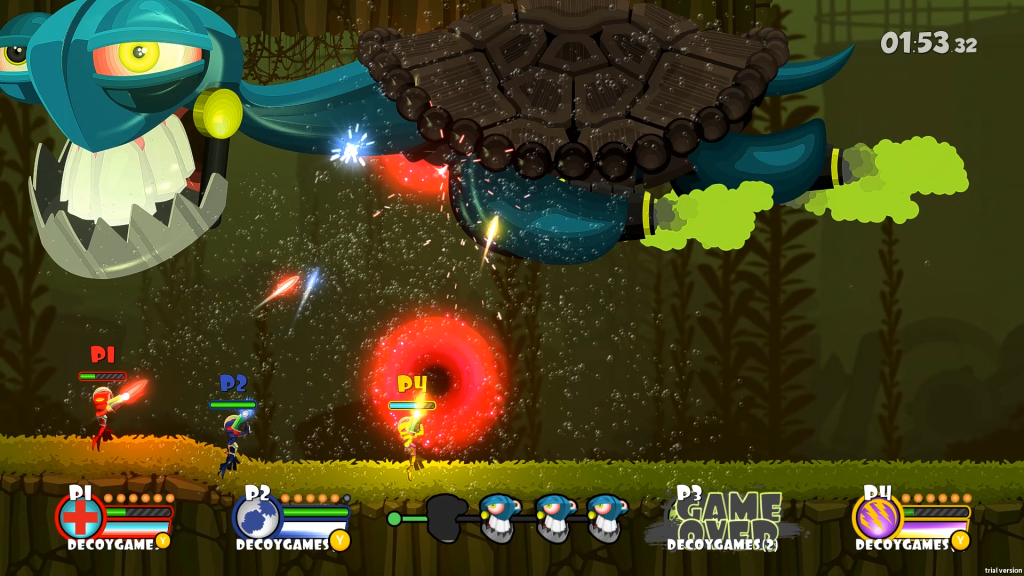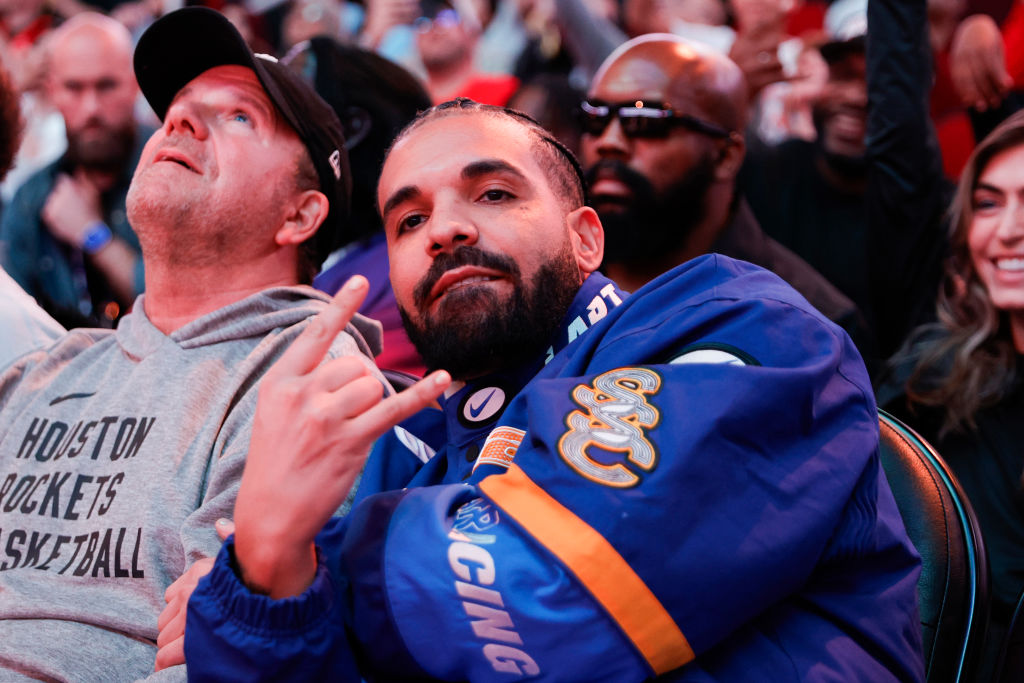
Source: Decoy games press / Decoy games
While the gaming industry has made (many superficial) efforts to diversify their content and their offices, there’s still work to be done. Rather than deal with what’s become an uphill battle, many developers of color have gone the indie route to create their own titles and pave their own lane in the industry. Brothers Khalil and Ahmed Abdullah are among them, having created the award-winning game Swimsanity and founding Decoy Games in the spirit of being the change they wanted to see.
Developer communities have helped them immensely along their journey. Playcrafting is one such community of indie developers that have been shining the spotlight on independent developers and has created Play NYC, an annual event that boasts an impressive array of mainstream and indie developers coming to show off their wares to the gaming community. Play NYC has become one of the largest gaming events in the United States. We spoke to the Playcrafting alums and the award-winning Decoy Games team, who created a game and a company out of their love of games.
CASSIUS: Tell us how you got involved in developing games.
Decoy Games: It started when I was in my senior year of college. That was the first time I started developing games. It was like a flash development class and the midterm for that class was to make a simple flash game. The game I made, you controlled this character that went to the bottom of the ocean trying to get gold while different creatures tried to kill him. It was inspired by this game called Octopus using Mario characters and stuff.
A lot of people really liked it. They would play it outside of the classroom. I would walk into the computer lab and see people playing it. I think that was the thing that made me say, “Ok, maybe I want to pursue this.” And Ahmed is always the one who pushes things to the next level, so he started researching the xpa program and all these different things. This was right when indies started becoming a mainstream thing and there were different ways you could get titles out. We didn’t have any credentials, and through many of the conversations, we had we decided to go into it together since we had the same background. We really started working on game ideas and development from there.
Ever since we were young, maybe middle school, we used to play this game called Company, and we each would have our own entertainment company. They usually revolved around comics or video games. We would make paper prototype games and we would sell them to our fake customers — all just us two, by the way. We would make these elaborate paper prototype games, and I think between making fake video games and running a fake company, it really boiled into this desire to get into this space, which got real popular as we got in our college years. We have been messing around and making creative projects since when were young, particularly in a competitive fashion like “I’m trying to take his business out and he’s trying to take my business out.” But now we’re working on the same thing, which is pretty cool.
C: What were your favorite games growing up?
DG: One of the games we played a lot was Perfect Dark. That was kind of the spiritual successor to Golden Eye. We played Golden Eye a bit, but we always saw that Perfect Dark was able to culminate the different options in a game to get the ultimate amount of replay ability, and we always liked multiple experiences. With Perfect Dark, you can play with bots. We spent so many hours on that, so it was like one of our top games. Bomberman was a big inspiration for us as well. We were like top three every month on Xbox for it. Our mom is into video games, too, and she played Bomberman quite a bit. So we took inspiration from her on playing that one.
C: Your mom got you into gaming?
DG: Yeah, instead of a mom telling us not to play games, she kind of used the games to keep our minds open and constructive instead of going out and getting into trouble and what not. One of those games she kinda got us started out on was Bomberman. Back then, my mom used to work at Toys R Us, and whenever there were games on clearance she would bring some home and we were able to try out all sorts of games because of that, which was pretty cool.
Our mom is like a low-key hardcore gamer. She doesn’t know how hardcore she is. But she is really hard core.
CL: Tell me about the game Swimsanity.
DG: It’s an underwater shooter with competitive and cooperative game modes. You can play with up to four people in some of the game modes. Most of the game modes are competitive, so you’re trying to get the most KOs or trying to capture a flag. You can play on or offline in those game modes, and that also goes for the coop game mode. When we bring it to shows, it might look like it’s just a competitive game, but we have a number of modes including an adventure mode where you can work together to fight against these big sea creatures or a horde mode where you try to survive an assault.
What we were trying to do is make every single game mode feel like its own game. When we looked at other indie games that are out there, we felt like that they tried to deliver on one game mode and ship it off, but we wanted to put together a package. A lot of times we would find that in a AAA game, so we tried to find that balance between bringing those two together. That’s’ why we were so excited to bring that online aspect to it so you can do matchmaking with the ranking and such going on leaderboards, play in custom rooms, and things like that. We wanted to have the ultimate multiplayer couch co-op or online co-op experience in one package.
C: What has been the game feedback been like?
DG: Humbling so far. To go from essentially a class project to seeing people line up to play the game, get excited and come to multiple shows, it’s a really cool experience to see, especially in today’s climate. To see people coming together and play something that we made up in our bedrooms, essentially.
C: What inspired Decoy Games?
DG: From the beginning, we always wanted to not just make a game. The reason why we took our time when we started right out of college is we wanted to be ready to do this in a way that we could take our own path on it and also be owners of the business — learn how to actually run the business of gaming, but also develop it. Really, it was right when we started creating the flash game when we were like, “Cool let’s bring it to consoles,” which was a task because at this point we didn’t know what it meant to be a professional developer. Like what does that even mean? How do I go to the Xbox and make a game? How do we get started? So using those years to work on the game, but also learn what it means to be a professional developer in the industry and publisher. That was our goal from the beginning and one of the coolest parts of the whole journey.
I think while Swimsanity is definitely our entry title, just from the gaming side alone, we have so much that we want to show the world. We have a lot of ideas that cater to the identity of our team, but also beyond that we feel like we have a lot to offer outside of just the games itself. Whether it’s different avenues of entertainment in the community, we really think we have an approach to games that has rarely been seen before.
We don’t want to just make a game and then go back to our computers and start working on the next one. We really want to interact with the people, anyone who is an aspiring developer or has any kind of goal in the industry. [We want] to show them different avenues they can enter and also we don’t really run away from our identity either. We have the potential to be a really good representation for people of color in the industry, and we have a lot of avenues we want to explore with that. As far as getting into the community, [we want to inspire] others and give them the confidence that they can get into this industry.

C: Do you think that you being POC gave you a different perspective in the gaming industry?
DG: In general, as developers of color, I feel it is one of the industries we have so much potential to lead because from a consumer stand point a lot of the consumers are of color. We definitely push the industry in that standpoint. Now we have to find a way to get people of color to actually not only be developers, but push them to leadership roles and create products that can be made accurately from the culture we came from.
I think there are a lot of games out there that try to imitate that and try to make that happen, but without having people of color in those leadership positions, it doesn’t come out as genuine and authentic. We’ve kind of seen that in the movie industry in the last few years. We see Jordan Peele making the horror movie starring a Black cast without the Black tropes you usually would see. It’s literally just a horror movie with Black people in it. You’re almost waiting like, “What’s the underlying tone?” and he said himself that he just wanted to make a movie with Black people being in the forefront. We hope we can kind of start opening those doors for that to the gaming industry.
C: You have developers like Ubisoft, for example, that have made a concentrated effort to add diversity to their games. But is it enough to have it in the forefront, or do we need more in the background?
DC: I would want representation on all fronts. I think the problem now is that the representation is so weak that whenever we do have someone of color, whether they are a developer or a character, it’s a story. And the only reason it’s a story is because there is so little of it. I think that’s a problem. We want it to be that eventually it’s so normal having a Black character or seeing a Black team of developers it doesn’t come off as anything serious. It should be, “Oh, it’s just a group of developers” and not, “Oh it’s whatever underrepresented group.”
C: What tips do you have for someone trying to create a game or get into self-publishing?
DG: For someone trying to get into development some tips I have are that there are so many tools nowadays that are publicly available for free. I don’t care if you’ve never coded or don’t know how game development works. First step would be just going online and researching how to make games. You’ll be surprised at what you can learn in just one sitting and the information that is public and available to you. Tools like Unity are free to download. You can download full games and just mess around and tweak little things and they have tutorials and stuff to get you going. I would tell people that it’s a lot easier not to get started than it is to open up your computer and get started.
My other tip is get involved in the game development community. I’m always surprised at how people that have been aspiring indie developers for so many years are not willing to join or are aware of the great communities that are available. One of our biggest launch pads has been the Playcrafting community. We started off in Boston, but they have ones in New York, a couple different ones in California, and they’ve been a huge pad for us to get our game in the public, interact with gamers and get in contact with different members of the media — things that indies have a hard time doing.
When it comes to self-publishing, the best tip I have is have a financial plan and don’t rush it. So for us, for 95% of the game development, we were working at another company to keep those funds coming in and we were doing this on the side until about a month ago, when we went full time on game development. That was because we wanted to have a financial plan in place so we have something we can invest in ourselves and push forward. That could come in the form of doing it on the side or getting some funding, but have a plan in the very least. Don’t just jump in right away. It’s going to allow you to be able to take your time and also be able to make those choices you want to make, go those places you need to be, and that’s one thing that helped us. We had a plan and were patient with it to see where it went.
C: What’s next for Decoy Games?
DG: We have a couple a few more expos immediately. Outside of Swimsanity we have some amazing concepts for ideas that we want to bring out. As fun as Swimsanity is, we can go further and put games out there for others to enjoy.

Source: Decoy games / Decoy games
















